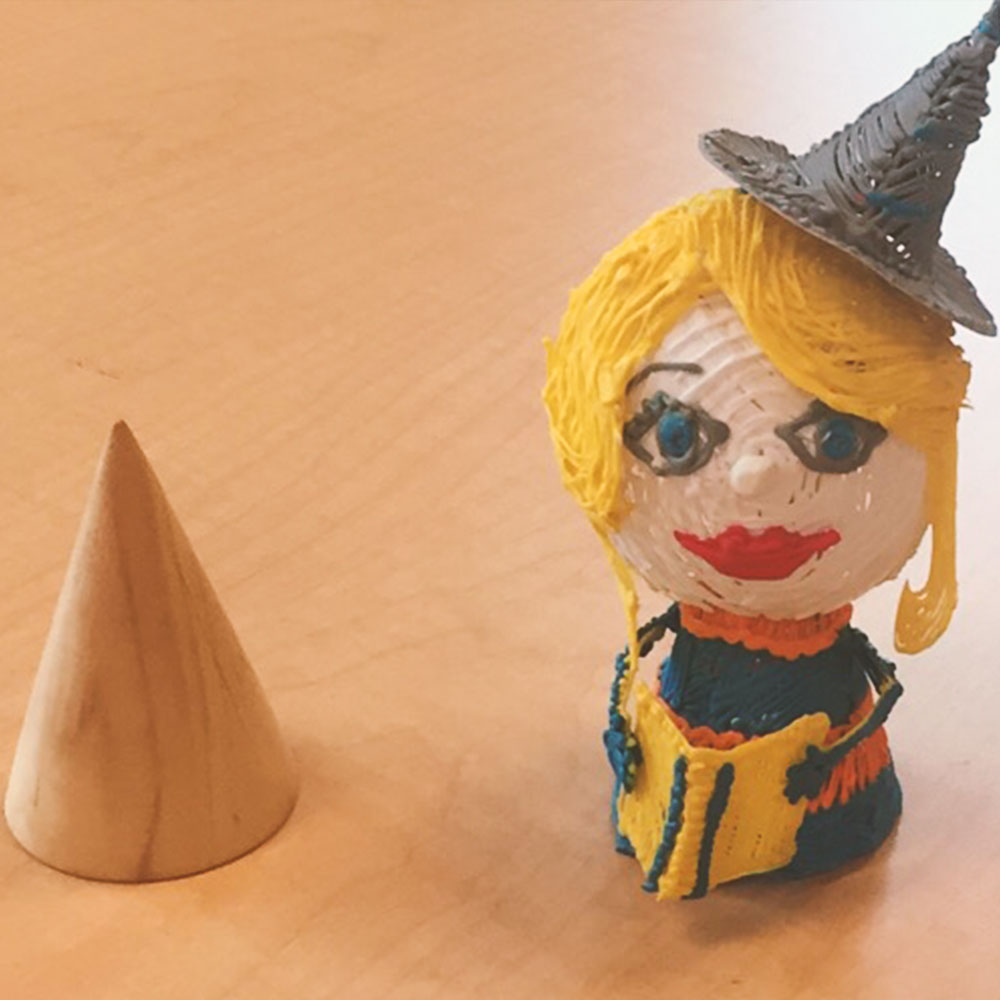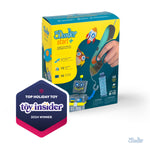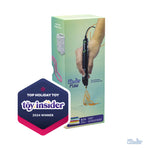Doodle-Wobblehead Notables
In this activity, students will work in pairs to research a historic notable, isolate 5 of the most interesting research facts about them, and incorporate those facts into a wobble head design which they'll doodle with a 3Doodler.

KnowledgeStudents havedetermined a historic or notable figure to research.
had practice with a 3Doodler drawing lines, shapes, fill, and welding.
determined a historic or notable figure to research.
had practice with a 3Doodler drawing lines, shapes, fill, and welding.
ObjectivesStudents willlocate resources, e.g., books and internet sites, to answer questions about a historical or notable figure.
creatively synthesize interesting aspects of research subject into a design for a wobble head.
use a 3Doodler to create a wobble head based on a design.
locate resources, e.g., books and internet sites, to answer questions about a historical or notable figure.
creatively synthesize interesting aspects of research subject into a design for a wobble head.
use a 3Doodler to create a wobble head based on a design.
MaterialsStudents will need3Doodler (1 per pair)
3Doodler (1 per pair)
Lesson PlanInstructions
Step 1 - PREPARATIONPrint out copies of the Doodle Wobble Head Research Worksheet.
There are two parts to this project: Research and Design.
Step 2Share the digital and print sources that students are permitted to use, and show them how to make proper citations. It is sufficient for students to cite the title and the page number for books, and the URL and title of a web page.
Step 3Discuss the rules for internet safety when searching on the web. Refer to this resource by Common Sense Media.
Step 4Review the research questions from the Doodle Wobble Head Research Worksheet. Demonstrate how to paraphrase parts of a text in order to avoid plagiarism.
Step 5Give students time to research their historic notable in the library and on the web using safe search engines, such as Infotopia.info.
Step 6Share the goal with students: During this session, students will incorporate 5 interesting research-based aspects of your historic notable in an original wobble head design, and then create it with a 3Doodler.
Step 7Share the definition of a bobble head, i.e., a figurine with a disproportionately large head mounted on a spring so that it bobs up and down, often made as a caricature of a famous person. Note how it is similar to a caricature which exaggerates an individual's most notable physical characteristics.
Step 8Model how to select 5 characteristics of a researched notable and how to symbolically incorporate them into a sketched design for a wobble head.
Use the elf in this example to show how one can make a Bobblehead doll with a cone shaped base.
Step 9Demonstrate how to doodle a wobble head using a ball around the size of an orange covered in foil or use a sphere shaped mold. Doodle over sphere in quarters or halves, and then weld the pieces together.
Step 10Doodle over a cone-shaped block or piece of cardstock rolled into a cone shape for the body.
Step 11Doodle the body parts and accessories, then weld them to the doodled-body.
Step 12Create a doodled spring and weld one side to the inside of the doodles head. Weld the other side of the spring to the apex of the doodled cone shaped body.
Step 13Circle to assist and assess.
Step 14 - OPTIONALPresent as a design challenge with students, determining solutions for how to get a wobblehead to wobble back and forth and up and down on its body. In this scenario, students may experiment with springs, sticks, dowels, etc.
Print out copies of the Doodle Wobble Head Research Worksheet.
There are two parts to this project: Research and Design.
Share the digital and print sources that students are permitted to use, and show them how to make proper citations. It is sufficient for students to cite the title and the page number for books, and the URL and title of a web page.
Discuss the rules for internet safety when searching on the web. Refer to this resource by Common Sense Media.
Review the research questions from the Doodle Wobble Head Research Worksheet. Demonstrate how to paraphrase parts of a text in order to avoid plagiarism.
Give students time to research their historic notable in the library and on the web using safe search engines, such as Infotopia.info.
Share the goal with students: During this session, students will incorporate 5 interesting research-based aspects of your historic notable in an original wobble head design, and then create it with a 3Doodler.
Share the definition of a bobble head, i.e., a figurine with a disproportionately large head mounted on a spring so that it bobs up and down, often made as a caricature of a famous person. Note how it is similar to a caricature which exaggerates an individual's most notable physical characteristics.
Model how to select 5 characteristics of a researched notable and how to symbolically incorporate them into a sketched design for a wobble head.
Use the elf in this example to show how one can make a Bobblehead doll with a cone shaped base.
Demonstrate how to doodle a wobble head using a ball around the size of an orange covered in foil or use a sphere shaped mold. Doodle over sphere in quarters or halves, and then weld the pieces together.
Doodle over a cone-shaped block or piece of cardstock rolled into a cone shape for the body.
Doodle the body parts and accessories, then weld them to the doodled-body.
Create a doodled spring and weld one side to the inside of the doodles head. Weld the other side of the spring to the apex of the doodled cone shaped body.
Circle to assist and assess.
Present as a design challenge with students, determining solutions for how to get a wobblehead to wobble back and forth and up and down on its body. In this scenario, students may experiment with springs, sticks, dowels, etc.
Wrap Up
Assessment
Possible Extensions
Vocabulary
author - a writer of a book, article, or report.
collaboration - to work jointly with others or together especially in an intellectual endeavor.
creative thinking - a way of looking at problems or situations from a fresh and imaginative perspective.
problem-solving - the process or act of finding a solution to a problem.
reading - the form or version of a given passage in a particular text.
writing - any written or printed paper, as a document or deed.
Educational Standards
Conduct short research projects to answer a question, drawing on several sources and generating additional related, focused questions for further research and investigation.
Students will research a historic notable.
Gather relevant information from multiple print and digital sources, using search terms effectively; assess the credibility and accuracy of each source; and quote or paraphrase the data and conclusions of others while avoiding plagiarism and following a standard format for citation.
Students will gather information from. at least 3 different sources using digital and print information and paraphrasing, avoiding plagiarism.
Write routinely over extended time frames (time for research, reflection, and revision) and shorter time frames (a single sitting or a day or two) for a range of discipline-specific tasks, purposes, and audiences.
Students will complete this writing project over a short time frame as part of a larger writing program.
Develop the topic with relevant, well-chosen facts, definitions, concrete details, quotations, or other information and examples.
Students will include quotations, well chosen facts, and relevant information in their answers about researched notable.
Integrate quantitative or technical information expressed in words in a text with a version of that information expressed visually (e.g., in a flowchart, diagram, model, graph, or table).
Students will integrate researched information about their historic notable in a physical wobblehead model they they designed and created.
Define the criteria and constraints of a design problem with sufficient precision to ensure a successful solution, taking into account relevant scientific principles and potential impacts on people and the natural environment that may limit possible solutions.
Students will determine a design solution to make the head of the wobblehead wobble up, down, back and forth on its body.
Develop a model to generate data for iterative testing and modification of a proposed object, tool, or process such that an optimal design can be achieved.
Students will develop an effective design for a wobblehead, which will be demonstrated in a doodled model.
Exhibit a tolerance for ambiguity, perseverance and the capacity to work with open-ended problems.
Students will demonstrate willingness and competency within an open-ended task with more than one possible outcome.
Create original works or responsibly repurpose or remix digital resources into new creations.
Students will create original line drawings and alliteration with a 3Doodler.
Use collaborative technologies to work with others, including peers, experts or community members, to examine issues and problems from multiple viewpoints.
Students will seek feedback from peers before designing with a 3Doodler.





